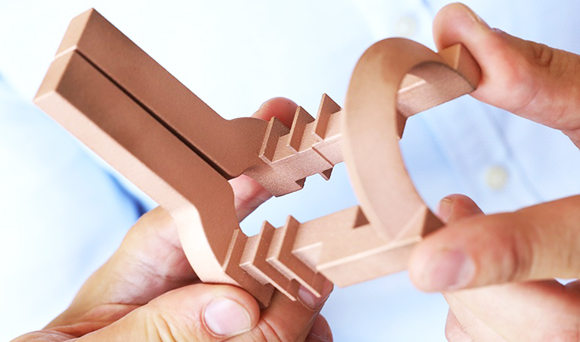GKN Powder Metallurgy sees value in production of induction coils by metal Additive Manufacturing
July 24, 2018

A copper induction coil produced by metal Additive Manufacturing (Courtesy GKN Powder Metallurgy)
GKN Powder Metallurgy has identified a promising application area for metal Additive Manufacturing in the production of copper inductor coils used for induction hardening processes. Induction hardening is used to increase the strength of components by users in the metal-processing industry, at automotive suppliers and in other fields where certain surface areas of components are required to withstand intensive mechanical loads and exposed to wear. The process is used to harden only the surface area of the component and does not have an effect on the internal hardness.
In induction hardening, a coil of highly conductive copper tubes, containing channels through which cooling water runs under high pressure, encloses the component. A high-frequency alternating current then flows through the induction coil, generating a powerful magnetic field which, in turn, induces eddy currents in the boundary layer of the component, giving off frictional heat. These eddy currents heat the component surface very quickly to the temperature required for hardening. Afterwards, it is quenched for sudden cooling.
The traditional manufacturing process for inductor coils relies on soldering, which the company explained is a complicated process which can create imperfections in the final product. Using metal AM, inductors can be produced which offer reproducible hardening results, three to four times longer service life, a shorter set-up time when used with hardening machines, and a reduction in operation and investment costs through better machine utilisation. In addition, the closer the shape of an inductor coil is to the shape of the component being hardened, the better the results of the induction hardening process – for this reason, the geometric design freedom offered by AM is a key advantage.
In an article on its GKN Powder Metallurgy Blog, the company stated that currently, awareness of the advantages offered by metal additively manufactured inductor coils remains low. “We predict that it will take another year before the industry understands this advantage,” stated article author Galina Ermakova, GPC Engineer for Additive Manufacturing at GKN Powder Metallurgy. “In a market like induction hardening, users aren’t eager to blindly trust that the first 3D printed inductors will work as needed.”
To help drive awareness and trust of AM inductors among users, Ermakova stated, “Users will have to intensively test and experience 3D printing first, and we need to schedule time for that. Once users gain confidence and realise that 3D printing delivers reproducible results, nothing will ever be the same.” GKN Powder Metallurgy is encouraging users to approach its team for a review of whether inductors are suitable for AM. For more complex designs, the team will support customers through the redesign process to achieve a more efficient geometry.
















